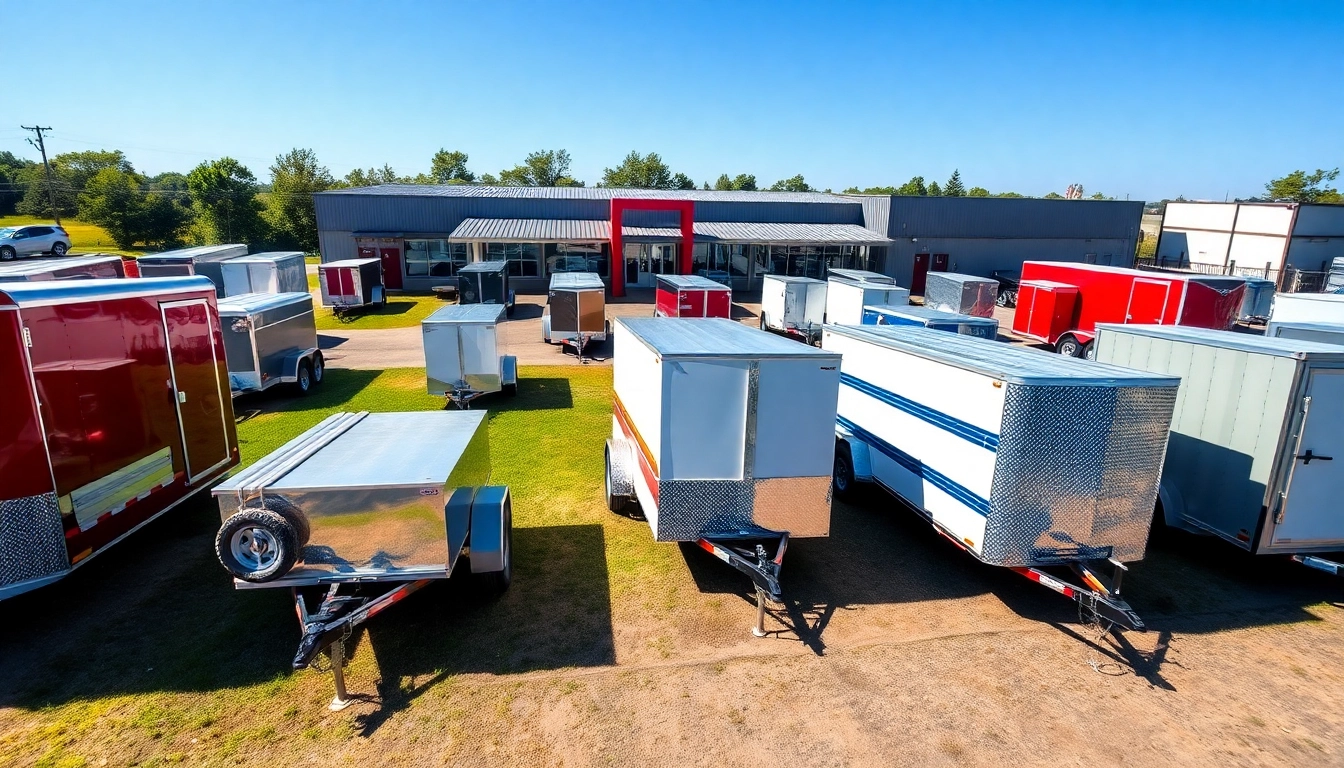Understanding Trailers: Types and Uses
Trailers play a crucial role in transporting goods, recreational items, and even livestock. Understanding the different types of trailers available can help potential buyers or renters make informed decisions based on their unique needs. In your search for trailers near me, it’s important to consider the various styles and their specific functionalities.
Utility Trailers: The Go-To Choice for Versatility
Utility trailers are among the most versatile options available, ideal for a range of tasks from hauling furniture to transporting lawn equipment. They often have customizable features that can accommodate various materials and sizes, making them suitable for both personal and business use. One of the main advantages of utility trailers is their ease of loading and unloading, allowing for efficient handling of items without the need for complex equipment.
These trailers come in various sizes and can be open or enclosed, catering to different preferences and requirements. For example, an open utility trailer might be perfect for transporting landscaping equipment, while an enclosed trailer offers better protection for items like furniture during transport. Many utility trailers are also designed with ramps, making it easier to load heavier machinery like ATVs.
Livestock Trailers: Ensuring Safe Transport for Animals
For those in agricultural industries, livestock trailers are specifically designed to transport animals safely and comfortably. These trailers often feature ventilation systems, padded interiors, and non-slip flooring to ensure that animals are secure during transit. Safety features such as escape doors and secured tie-down points are also essential, helping to protect both the livestock and the driver.
The design of livestock trailers can vary significantly based on their intended use. For example, a trailer tailored for cattle transport may have higher sides and more robust support structures, while one designed for smaller animals like sheep or goats could be more compact. Understanding the specific requirements for your livestock is crucial when considering which type of trailer to purchase.
Dump Trailers: Efficient Solutions for Heavy Loads
Dump trailers are engineered to handle hefty loads, making them indispensable for construction, landscaping, and waste management. Their hydraulic lift systems allow for easy unloading, which is particularly beneficial when moving dirt, rocks, or debris. Unlike standard utility trailers, dump trailers provide greater ease and efficiency in disposal because they can unload cargo with minimal effort.
Potential buyers should consider the weight capacity, durability of materials, and overall build of the dump trailer before making a purchase. For instance, those operating in rough terrains may require trailers with heavier frames and specialized suspensions to ensure stability and durability. Additionally, choosing the right size in relation to your vehicle’s towing capacity is essential for safety and performance.
Benefits of Buying Trailers Near Me
When looking for trailers, proximity can influence your buying experience. Accessing a local dealer can bring with it several advantages that enhance overall satisfaction with your purchase. Here are some key benefits of buying trailers near you:
Convenience of Local Access and Support
Purchasing a trailer locally means reduced travel time and convenience in accessing post-purchase services. Local dealers often provide personalized support, making it easier to resolve any issues post-sale. In-person visits also allow potential buyers to see different trailer types firsthand, inspect the quality of the build, and inquire about specific features.
Inspection and Test Drive Opportunities
One of the most significant benefits of buying locally is the ability to inspect the trailer physically and take a test drive. This practical approach ensures that you are aware of the trailer’s condition and functionality. Local dealers often provide opportunities to test various models, allowing you to assess handling and compatibility with your towing vehicle.
Furthermore, being able to assess the build quality, features, and overall design of the trailer firsthand is instrumental in avoiding potential pitfalls associated with online purchases. Some essential aspects to evaluate include hitch type, brake systems, and interior configurations.
Community-Based Services and Networking
Buying locally means becoming a part of a community. Local businesses often foster a network of customers and services that can help you in the future, whether through referrals or shared experiences. Engaging with community events, trailer shows, or exhibitions can also enhance your knowledge and understanding of the trailer market while giving you insights into what fellow owners appreciate in their trailers.
Factors to Consider When Searching for Trailers
Determining which trailer is the best fit for your needs requires careful consideration of several factors. Before making a decision, take the time to reflect on the following:
Size and Capacity: Matching Your Needs
Size is perhaps the most critical factor when it comes to choosing a trailer. You should assess what you plan to transport and choose a trailer that provides enough capacity without exceeding legal load limits. Researching local regulations can help ensure that you don’t encounter unexpected fines or legal issues.
As a rule of thumb, consider the weight and dimensions of your cargo. It’s often wise to opt for a trailer that offers slightly more capacity than you believe you will need, as this allows flexibility should your requirements change.
Trailer Features: Enhancing Utility and Safety
Features in trailers can vary significantly and play a crucial role in productivity and safety. Some key features to look for include:
- Braking systems: Electric brakes can provide better stopping power for heavier loads.
- Tie-down points: Quality trailers have multiple secure points to strap down cargo effectively.
- Material quality: Look for trailers made of high-strength materials that can withstand wear and tear.
Additionally, specialized features such as toolboxes, ramps, and lighting can significantly improve the utility and user experience.
Budgeting: Keeping Costs in Check
Establishing a realistic budget is vital when seeking a trailer. Costs can range dramatically based on type, size, and features. While it may be tempting to opt for a lower-priced option, evaluating overall value rather than just the starting price is crucial. A cost-effective trailer should offer durability and functionality in the long run.
Consider not just the purchase price, but also ongoing expenses such as maintenance, insurance, and any necessary upgrades. Creating a detailed budget can help ensure financial peace of mind when making your purchase.
Where to Find the Best Trailers Near Me
The search for a suitable trailer involves exploring various outlets. Understanding the pros and cons of different sources can help narrow down your options.
Local Dealerships vs. Online Listings
Local dealerships provide the benefit of immediacy and personal connection. In contrast, online listings offer a broader array of options to compare from the comfort of home. Potential buyers should evaluate whether they prioritize hands-on dealing with experts or prefer the convenience of browsing an extensive selection online.
Keep in mind that many dealerships also maintain an online presence, allowing you to explore their inventory before visiting in person. This hybrid approach can save time and ensure you’re visiting only the locations that have your preferred models in stock.
Reviewing Customer Testimonials and Ratings
Customer reviews offer valuable insights into a dealership’s reputation and service quality. Finding reputable dealers and models can often be achieved by researching online testimonials and ratings. Look for patterns in the feedback—consistent complaints or praises can give you a clearer picture of what to expect.
Furthermore, engaging directly with previous customers or following local trailer forums can provide firsthand feedback on specific dealerships or trailer types.
Seasonal Sales and Promotions to Watch For
Many dealerships offer seasonal sales or promotions, especially around holidays or the end of the fiscal year. Keeping an ear out for these sales can provide significant savings on your trailer purchase. It’s also advisable to check manufacturers’ websites for promotional events or discounted models that might not be advertised at local dealerships.
Another strategy is negotiation; being aware of market trends may empower you to negotiate better terms or lower prices with dealers.
Final Steps: Making the Right Purchase Decision
After thorough research and consideration, it’s essential to make informed decisions before finalizing your trailer purchase.
Understanding Warranty and After-Sales Service
Warranties can vary based on model, features, and manufacturer. Before finalizing a purchase, make sure understanding the warranty and any service packages being offered. Investigating the length of the warranty and what it covers can save you costs down the line. A good warranty provides peace of mind and an assurance of quality from the manufacturer.
Financing Options and Payment Plans
Lean on dealership staff to learn about financing options. Collaborative discussions can reveal potential payment plans, leasing alternatives, or financing entities that specialize in trailers. It’s crucial to ensure that repayment schedules are manageable within your overall budget.
Review interest rates to ensure that they align with your financial situation. In some cases, you might find better interest rates from external lenders compared to those offered by the dealership.
Preparing for Your Trailer: Registration and Insurance
Before hitting the road, it’s essential to register your new trailer with local authorities. Registration requirements can vary by state, so be sure to check for the necessary paperwork and fees involved. Additionally, securing appropriate insurance for your trailer is vital. Insurance can protect against potential damages and liabilities that could arise during use.
Once your trailer is registered and insured, familiarize yourself with safe towing practices to ensure a smooth experience on the road.
In conclusion, navigating the world of trailers requires careful planning and research. By understanding the types of trailers available, the benefits of buying local, and the critical factors to consider, you can ensure that you find the perfect trailer to meet your needs.



